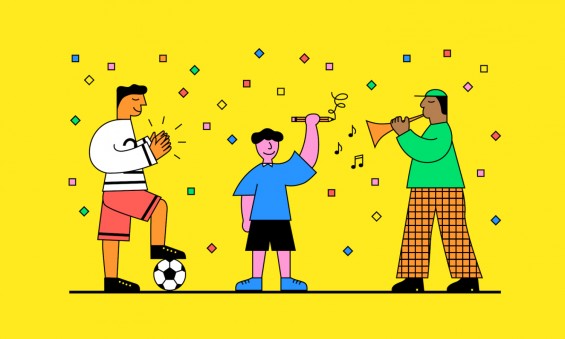
8 things TED learned from our high school interns
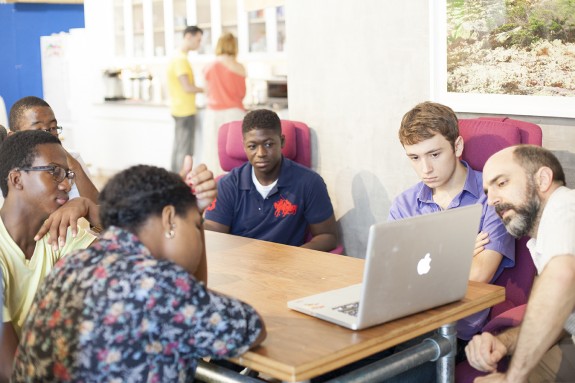
From back row, clockwise: Tayler Blevins, Yaya Ly, Lucas Feuser, Franz Palomares, Iman Francis and Cedric Paul discuss animation
This summer, TED-Ed hosted five student interns from high schools around New York City. These interns, ranging from sophomores to seniors, helped us in our daily work and also joined workshops where they had the opportunity to ask different members of the TED staff about their jobs. Within each workshop, we also assigned them a small project. While the team’s expectation might have been that we would be ‘teaching’ these high school students, we quickly realized that they had just as much to teach us! Below are eight lessons the TED staff learned from our high school interns.
Caroline Cristal (TED-Ed Clubs workshop): The main thing that I took away from working with our high school interns this summer is that if and when you give young people an opportunity to voice their opinions, they will. Not only will they voice their opinions, but when you show genuine interest and curiosity in what they are saying, they will provide even more of their thoughts and ideas — many of which ended up being incredibly helpful. This all ties in to what I believe is the goal of TED-Ed Clubs: to amplify the voices of students. And when we, as adults, let them know that we are listening, they have some pretty great things to say.
Lisa LaBracio (Animation workshop): Franz and I had the chance to collaborate with the high school interns to make a quick pixilation animation after having learned some basic animation principles earlier that day. We animators have made and seen so much animation that we tend to get stuck on recreating the oldest tricks in the book — but when Franz and I let the students take the director’s chair, suddenly there were visual ideas on the table that we never would have thought to try! (See below for the final animation!)
Emilie Soffe (Social media workshop): The interns reminded me that students are super smart – a lot of the writing that they sent me as part of their project was on par with (or better than) what I write! I also realized that this generation of students (or maybe every generation) is very wary of writing that feels inauthentic, like the author is ‘talking down’ to them. Finding the topics that spark curiosity and presenting them clearly and concisely is far more important than being clever.
Chris Hardy (Conference production discussion): I’m always inspired by kids, by their curiosity. I thought that this group of interns was really good at asking questions. I think I was sometimes embarrassed to ask questions in school, but I thought that these students asked really good questions! And that’s really important to keep doing.
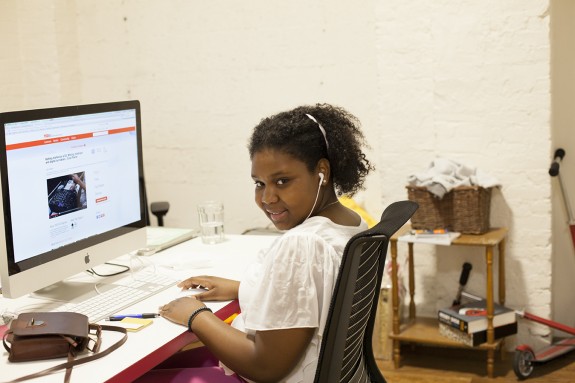
Iman Frances poses for a photo while hard at work
Kate Torgovnick May (Writing workshop): I assumed the interns would be most interested in hearing about what kinds of careers are out there for writers. This kind of made them yawn—they’re just not thinking that far ahead, nor should they be. They reminded me that, when you’re in high school, everyone is a writer. They were more interested in talking about the mechanics of writing—how to push past writers block, how to take something boring and give it more interest, how to get organized before starting the actual writing. They were interested in the kinds of things I’d normally only talk about with writer friends.
Stephanie Lo (TED-Ed content workshop): Something our team always asks when we produce TED-Ed content is, “What will learners take away from this TED-Ed Lesson, and how will this lesson cause the audience to want to learn something else?” We had the perfect opportunity to ask the interns to evaluate and give feedback on TED-Ed content while they were here. I was impressed by how intuitive they felt about the animation and design of the visuals, which reminded us to keep animation a big priority. They also had some fantastic TED-Ed Lesson suggestions that very well may make it into our production cycle!
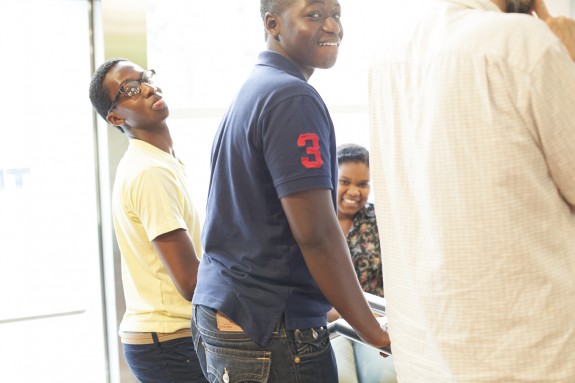
Clockwise from left: Cedric Paul, Yaya Ly and Iman Frances smile for the camera while creating their own stop motion animation
Isaac Wayton (Video editing and production workshop): I’m always excited to discuss all the “behind the scenes” work that goes into creating a TED Talk for the web. From the pre-production (planning) stage all the way through the post-production (editing) stage, there are a lot of moving pieces involved that the general viewing audience doesn’t hear about. I really enjoyed explaining these aspects to the interns so that they can share that knowledge with others and hopefully use it to create their own videos in the future!
Tristine Baccam (TED-Ed Clubs): Meeting with the interns was a great experience. It was truly helpful to have their feedback on TED-Ed Club materials. They helped affirm our understanding that students want to be engaged and that TED-Ed Clubs should not be afraid to ask more of students.
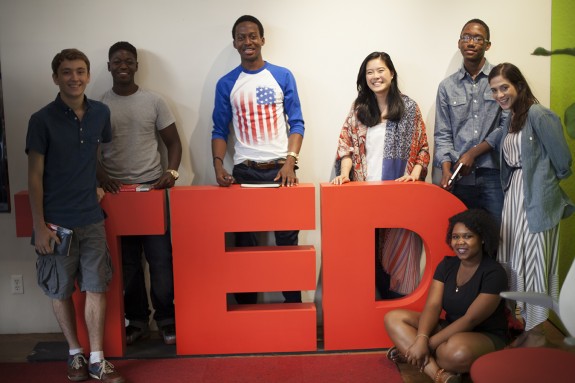
From left: Lucas Feuser, Yaya Ly, Cedric Paul, Stephanie Lo, Tayler Blevin, Iman Frances and Caroline Cristal pose with the TED letters
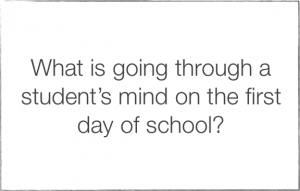
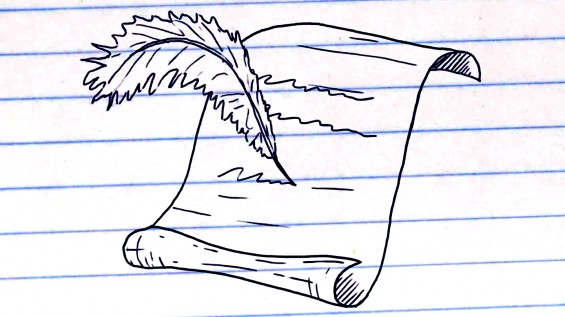
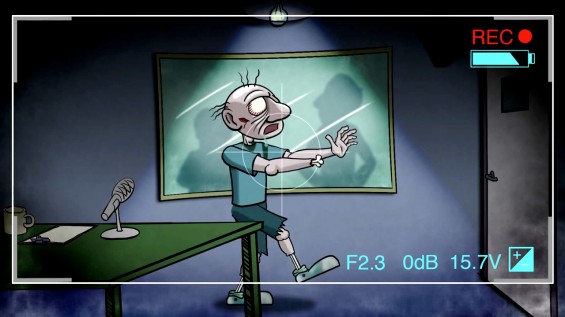
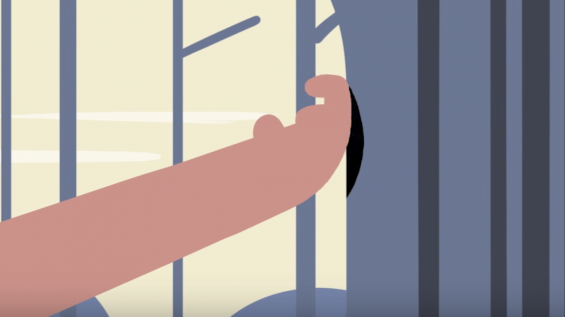
This was a very interesting article and I read each and every experience carefully. High schooler’s have a very interesting take on things and as a teacher it has always fascinated me. The learning from this experience is surely the fact that if you give high schoolers respect, they will give it back to you. And if you let them voice their opinions they sure will surprise you with their ideas. Lisa LaBracio’s story as so inspiring and so real too.. Yes we get stuck in a state of stalemate and what better source for ideas than young teenagers.
How can I organise a Ted-club. I am a former teacher and love this idea of Ted edu clubs.